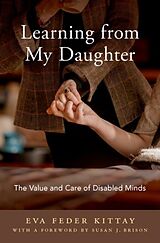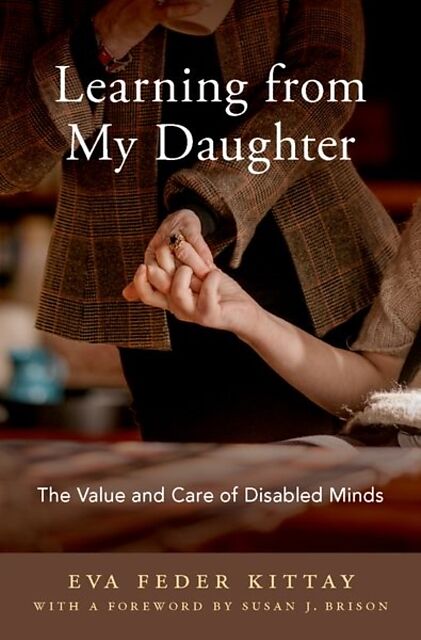Learning from My Daughter
Einband:
Fester Einband
EAN:
9780190844608
Untertitel:
The Value and Care of Disabled Minds
Genre:
Philosophie & Religion
Autor:
Eva Feder Kittay
Herausgeber:
Oxford University Press
Anzahl Seiten:
304
Erscheinungsdatum:
04.04.2019
ISBN:
978-0-19-084460-8
The advent of a new book from Eva Kittay fills me with gratitude and excitement: the clarity of her thinking and the wisdom of her heart mean that these arguments will be welcomed, puzzled over, disputed with, and treasured for many years to come.
Vorwort
Winner of the 2020 PROSE Award for Excellence in Philosophy by the Association of American Publishers
Autorentext
Eva Feder Kittay was Professor of Philosophy at Stony Brook University for over 35 years. She has authored and edited collections as well as numerous articles in the philosophy of language, feminist philosophy, and disability studies. Her pioneering work interjecting questions of care and disability (especially cognitive disability) into philosophy and her work in feminist theory have garnered numerous honors and prizes: the 2003 Woman Philosopher of the Year by the Society for Women in Philosophy, the inaugural prize of the Institut de Mensch, Ethik und Wissenschaft, the Lebowitz prize from the American Philosophical Association and Phi Beta Kappa, a Lifetime Achievement Award from the Center for Discovery, an NEH Fellowship, and a Guggenheim Fellowship. She is the parent of a daughter with very significant disabilities.
Klappentext
Through personal narrative and philosophical argumentation, Eva Feder Kittay relates how raising a multiply-disabled daughter has altered her views on what matters and gives meaning in life. She explores such difficult topics as the desire for normalcy, reproductive technology's promise that we can choose our children, the importance of care, and the need for an ethic of care.
Zusammenfassung
Does life have meaning? What is flourishing? How do we attain the good life? Philosophers, and many others of us, have explored these questions for centuries. As Eva Feder Kittay points out, however, there is a flaw in the essential premise of these questions: they seem oblivious to the very nature of the ways in which humans live, omitting a world of co-dependency, and of the fact that we live in and through our bodies, whether they are fully abled or disabled. Our dependent, vulnerable, messy, changeable, and embodied experience colors everything about our lives both on the surface and when it comes to deeper concepts, but we tend to leave aside the body for the mind when it comes to philosophical matters. Disability offers a powerful challenge to long-held philosophical views about the nature of the good life, what provides meaning in our lives, and the centrality of reason, as well as questions of justice, dignity, and personhood. These concepts need not be distant and idealized; the answers are right before us, in the way humans interact with one another, care for one another, and need one another--whether they possess full mental capacities or have cognitive limitations. We need to revise our concepts of things like dignity and personhood in light of this important correction, Kittay argues. This is the first of two books in which Kittay will grapple with just how we need to revisit core philosophical ideas in light of disabled people's experience and way of being in the world. Kittay, an award-winning philosopher who is also the mother to a multiply-disabled daughter, interweaves the personal voice with the philosophical as a critical method of philosophical investigation. Here, she addresses why cognitive disability can reorient us to what truly matters, and questions the centrality of normalcy as part of a good life. With profound sensitivity and insight, Kittay examines other difficult topics: How can we look at the ethical questions regarding prenatal testing in light of a new appreciation of the personhood of disabled people? What do new possibilities in genetic testing imply for understanding disability, the family, and bioethics? How can we reconsider the importance of care, and how does it work best? In the process of pursuing these questions, Kittay articulates an ethic of care, which is the ethical theory most useful for claiming full rights for disabled people and providing the opportunities for everyone to live joyful and fulfilling lives. She applies the lessons of care to the controversial alteration of severely cognitively disabled children known as the Ashley Treatment, whereby a child's growth is halted with extensive estrogen treatment and related bodily interventions are justified. This book both imparts lessons that advocate on behalf of those with significant disabilities, and constructs a moral theory grounded on our ability to give, receive, and share care and love. Above all, it aims to adjust social attitudes and misconceptions about life with disability.
Inhalt
Foreword by Susan J. Brison
Author's Preface And Acknowlements
Part I: Learning to Become a Humbler Philosopher
Chapter One: On What Matters/Not
Chapter Two: The New Normal and a Good Life
Part II: Learning to Think About Choosing Children and The Limits of Planning
Chapter Three: The Limits of Choice
Chapter Four: The Ethics of Prenatal Testing and Selection
Chapter Five: How Not to Argue for Selective Reproductive Procedures
Part III: Care in Philosophy, Disability and Ethics
Chapter Six: Dependency and Disability
Chapter Seven: An Ethics of Care
Chapter Eight: The Completion of Care: The Normativity of Care
Chapter Nine: Forever Small: The Strange Case of Ashley X
Bibliography

Leider konnten wir für diesen Artikel keine Preise ermitteln ...
billigbuch.ch sucht jetzt für Sie die besten Angebote ...
Die aktuellen Verkaufspreise von 5 Onlineshops werden in Realtime abgefragt.
Sie können das gewünschte Produkt anschliessend direkt beim Anbieter Ihrer Wahl bestellen.
Loading...
Die aktuellen Verkaufspreise von 5 Onlineshops werden in Realtime abgefragt.
Sie können das gewünschte Produkt anschliessend direkt beim Anbieter Ihrer Wahl bestellen.
| # | Onlineshop | Preis CHF | Versand CHF | Total CHF | ||
|---|---|---|---|---|---|---|
| 1 | Seller | 0.00 | 0.00 | 0.00 |
